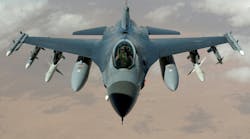By John Keller, Chief Editor
The United States is in the midst of a military research, development, and preparedness crisis. Few people realize it; of those who do, most underestimate its dimensions.
How did we get here? After all, the military business is booming, right? U.S. military forces are waging a global war on terrorism, and are deployed in substantial numbers in Iraq and Afghanistan, while keeping a close eye on conventional adversaries such as North Korea.
These conditions are not likely to change any time soon. Soldiers, sailors, airmen, and Marines are expected to remain active in the field at least for months, and probably for years, as they come to grips with the forces of international terrorism. Doesn't it stand to reason that the laws of supply and demand make the military a growth business?
In the open private market it might, but the military represents a government-driven market that bears precious little resemblance to private industry.
The difference is how the unique government market responds to demand. Where private industry responds relatively quickly to upticks by tooling up and increasing production, the government market is hemmed in by the annual congressional military appropriations and the occasional congressional supplemental appropriation.
These monetary sources that support military operations and preparedness for future conflicts have many competing demands on them, not the least of which are political hot-button issues such as Social Security, Medicare, education, and domestic homeland security.
The simple fact confronting the nation today is that there simply isn't enough money to go around for the adequate support of continuing military operations as well as preparedness for future conflicts. Almost all the available money is going to support military needs today in Iraq, Afghanistan, and elsewhere.
The stark fact is that these crucial military needs of today — bombs, bullets, boots, food, fuel, military salaries, and the costs of rebuilding Iraq — are starving military needs of tomorrow. That means not much money is left for research and development of future technologies that are considered necessary to fight and win the wars of tomorrow.
We're putting all our eggs into one basket — fighting today's wars in Iraq and Afghanistan. This has far-reaching effects on the U.S. capability to fight future wars and, increasingly, on the U.S. capability to fight these existing wars in the long term. The problem involves not only military-technology development, but also the infrastructure to carry out military operations in the future.
The military reserve and National Guard, for example, are nearing the breaking point. These organizations, which augment active military forces, continue to play a lead role in Iraq and Afghanistan. Guardsmen and reservists face activations and deployments that are far longer than they ever anticipated, placing a strain on them and their families.
Looking to the future, today's Guard and Reserve personnel are reluctant to remain members of their organizations out of concern that they will be ripped from their civilian lives and careers yet again to meet future military demands.
Technological research for the military's future needs remains a crucial issue. One member of the Office of Naval Research (ONR) recently commented ominously, "We have a lot of empty desks here." Military-research organizations such as ONR, the Defense Advanced Research Projects Agency, and the Air Force and Army research laboratories are forced, because of a lack of adequate funding, to rely not so much on the unique military research they should be doing, and instead turn to internal industry research, or research innovations spawned by the commercial market.
This kind of research will take the military only so far, even though commercial-technology development often is the best in the world. The reason: commercial technology, more often than not, is available to everyone — friends and foes alike. When the terrorists can get their hands on the technologies that inevitably will be used against them, they can come up with ways to defeat that technology quickly.
The nation's military leaders know this, which presents them with a fundamental dilemma. If military leaders can surmise, based on openly available technology, what countermeasures most likely will be brought against American forces, then military leaders must boost their requirements to compensate.
The problem is there is no money to meet these new requirements. This only sends military planners back to the commercial-technology well from which the terrorists also draw. It's a zero-sum game that can't go on forever.
Military planners often talk about "eating the seed corn." This refers to farmers who, in order to survive for the moment, eat the grain they otherwise would plant for the next year's crop. The ultimate result of eating the seed corn is starvation, only later rather than sooner.
The U.S. military today is eating its seed corn. If we can't afford to plan for tomorrow, then what happens when tomorrow comes?
This is a sobering question to ask, in light of recent events. For example, Philippine military forces began to pull out of Iraq after bowing to the demands of terrorists who had kidnapped a Philippine citizen and threatened to kill him.
Meanwhile, ominous clouds continue to gather over Iran, right next door to Iraq. Hassan Abassi, head of the Revolutionary Guards' Center for Doctrinaire Affairs of National Security outside Iran's Borders, has made no secret of his animosity toward the United States and his willingness to bring violence against U.S. citizens here and abroad.
In a statement, Abassi said, "We have a strategy drawn up for the destruction of Anglo-Saxon civilization." When and if that strategy unfolds, how prepared will American forces be to meet it?


